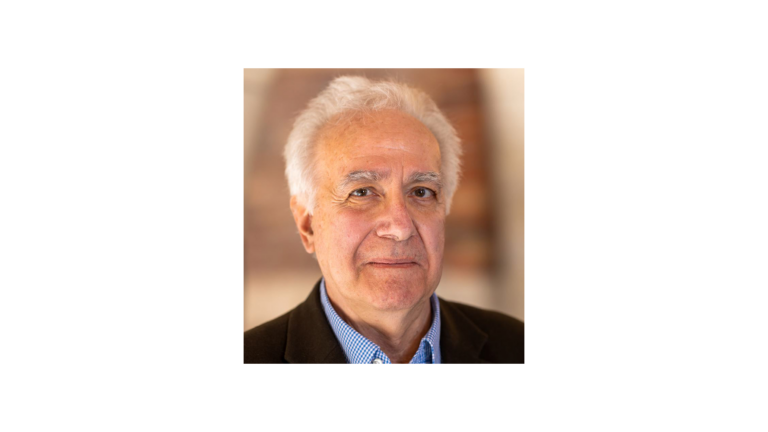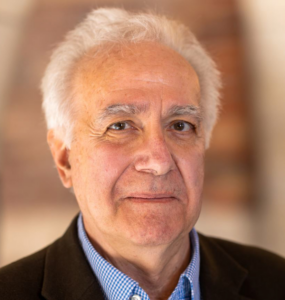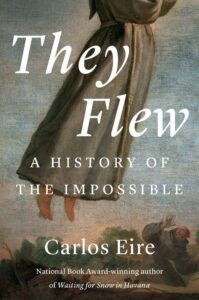
Scholar Q&A: Carlos Eire
Editor’s note: Carlos Eire is the T. Lawrason Riggs Professor of History and Religious Studies at Yale University and an IACS Affiliated Scholar. In the Q&A below, he discusses his vocation as a historian, what has changed and what has stayed the same about belief over the last 500 years, and how to understand “facts” and “reality.” Dr. Eire’s book “They Flew: A History of the Impossible” was published in September 2023 by Yale University Press.
How did you choose history as your discipline?
I chose to become a historian because I was born into a household in which the past was always more important than the present or the future. My father, especially, was obsessed with the past. It was one of his quirks, and it defined who he was and how he approached life. As a child I got the distinct impression by listening to him that the world used to be a better place and that everything had grown worse with the passage of time.
This unusual and pessimistic perspective to which I was constantly exposed created a similar obsession with the past in my mind, which made me gravitate towards the subject of history from an early age. Inchoately, step by step, as I moved on from grade to grade in, my passion for history grew stronger and stronger, and matured into a fascination with the past that was different from my father’s, and much less weighed down by pessimism about the present and the future.
In sophomore year of high school, I decided to become a historian, though at the time I had no real sense of what it took to become one, and – given the fact that I was a penniless refugee attending a rough-edged public school in Chicago by day and working a nearly full-time job at night — the prospect of attending college seemed like an impossible dream.
Nonetheless, as my passion for the past kept intensifying, I knew I would have to find a way to pursue what I saw as my vocation, and I did, eventually. By senior year of high school I knew, with the conviction and intensity that only teenagers can muster, that I absolutely had to become a historian. And not just a historian, but a historian of the Christian religion, for my life of faith at that time was quite intense, and focusing on any other kind of history seemed foolish.
So, I ended up getting a full scholarship to Loyola University of Chicago, which was only six blocks from home and adjacent to the elevated train line that took me back and forth between home and work. I double-majored in theology and history, and after finishing my undergraduate studies, I went directly into a doctoral program in history of Christianity at Yale. The rest, as the saying goes, is history.

And a general follow up: why do history at all?
My passion for history stemmed from the conviction that one cannot make sense of the present or work for a better future without knowledge of the past. Early on in my schooling, I realized that not knowing the past is akin to having amnesia or dementia. For individual human beings to lose their memories is disastrous. Without memory none of us humans can cope with day-to-day life, or even know where we are or who we are. The same holds true for societies and cultures, as well as religions.
Without a firm grounding in history — real history, not false versions of it, such as those that informed the Third Reich or the Soviet Union — failure is certain. More than that, such a failure can be catastrophic for individuals as well as entire nations. Knowledge of history gives one power as an individual, and it does the same for governments, societies, cultures, and religions.
George Orwell understood this principle thoroughly, which is why in 1984, the novel’s main character works at the Ministry of Truth, the agency through which a totalitarian regime constantly rewrites history to suit its ends, guided by the following principle: “those who control the present, control the past; and those who control the past control the future.”
On the one hand, having lived in a totalitarian communist state that resembled Orwell’s dystopia, and having been able to escape from it and its falsified ideologically-driven versions of history, which were employed as instruments of oppression, I have seen first-hand how dangerous it is to be ignorant of history and of its power to shape the future.
My passion for history stemmed from the conviction that one cannot make sense of the present or work for a better future without knowledge of the past.
On the other hand, being Catholic has made me realize the positive role that history has played in the formation of my faith as well as of my character. The very identity of Catholic Christianity is based on belief in the historicity of Jesus Christ and the historicity of the Church, its rituals, symbols, theology, and ethics. Consequently, the more acquainted any Catholic becomes with all of this history — which is really salvation history — the fuller and more dynamic their devotional life and self-understanding will also become.
They Flew asks broad questions about belief and unbelief and what is natural or supernatural—in the context of early modern history. What continuities across the centuries did you observe?
During its first fifteen centuries Christian belief was centered on the intermingling and utter inseparability of the natural and the supernatural. These two realms or dimensions were inseparably connected. Heaven was never too far from earth. The sacred was diffused in the profane, the spiritual in the material, the supernatural in the natural world. In the sixteenth century, however, the Protestant Reformation dismissed all of this intermingling as wrong and detestable. As Ulrich Zwingli, the Protestant reformer of Zurich, put it, “finitum non est capax infiniti,” that is, finite things are incapable of conveying the infinite, or divine.
Moreover, the leaders of the Protestant Reformation argued – as an essential belief – that all miracles had ceased long ago, around the year 100, when Saint John the Evangelist, the last of the twelve apostles of Jesus, was believed to have died. This doctrine of the cessation of miracles would be rejected by some Protestants much later, but that doctrine held sway to such an extent and for so many generations, that in the early twentieth century, the great sociologist Max Weber could argue that this “disenchantment of the world” brought about by Protestants marked the dividing line between the middle ages and the modernity.
This great discontinuity in Christian belief led to the formation of two distinct worldviews, with Catholics believing that divine realities constantly intermingled with the material ones, and Protestants believing that matter and spirit, as well as the natural and supernatural realms were not only distinct, but often incompatible.
Nonetheless, there was an odd asymmetry in the evolution of these two worldviews, for while Protestants rejected much of medieval Catholic theology, they adopted nearly all of medieval Catholic demonology. This meant that while Protestants denied that God still worked miracles, they continued to believe – along with Catholics – that the devil could manipulate nature, perform wonders of all sorts, and trick people into thinking that his control of nature was divine. This odd asymmetry had a polemical edge to it, and, in fact, was driven by Protestant need to deny that the miracles claimed by the Catholic Church could have a divine origin.
So, the more that Catholics polemicists argued that the many miracles that took place in their Church proved that it was indeed the true Church of Christ, and that the lack of miracles in Protestantism therefore proved that their churches could not be legitimate, the more that Protestants felt compelled to argue that all Catholic miracles were really nothing more than demonic tricks. As John Calvin, the Protestant reformer of Geneva, argued, “we must remember that Satan, too, has his miracles.”
Paradoxically, it was precisely at this point of disagreement over the cause of anomalous or wondrous events that Protestant and Catholic beliefs actually converged, for Protestants did not argue that phenomena such as the healings performed by saints and relics, or the levitations or bilocations of ecstatic mystics were impossible. No, as they saw it, these phenomena were possible indeed, but only through the intervention of the devil. And this is precisely why Catholics and Protestants persecuted witches with equal ferocity, for both traditions understood witchcraft to be a demonic religion capable of inflicting real harm on people and livestock.
Another way of explaining this odd continuity within a larger discontinuity is to say that Protestants continued to believe along with Catholics that those who turned their wills over to the devil completely could perform wonders. At the very same time, however, Protestants refused to believe that holy men and women who surrendered their wills to God could perform any genuine miracles. As Protestants saw it, there was no difference at all between levitating saints and flying witches, for both of them were borne aloft by the devil.

What has changed?
The largest change in beliefs that has taken place since the sixteenth century is that the skepticism and secularism that emerged gradually between the sixteenth and eighteenth centuries eventually eclipsed the Christian worldview, as well as widespread belief in a supernatural realm. The end result is that dogmatic materialism has become the dominant world view for the formerly Christian world, as well as for most industrialized societies on planet earth.
Nowadays, miracles and anomalous events, including levitation and bilocation, are considered absolutely impossible by the dominant materialistic culture of Western nations. Even some Catholics who consider themselves “devout” share in this worldview to some extent and are embarrassed or annoyed by fellow Catholics who still believe in supernatural phenomena or assign them significance.
And I can testify from first-hand experience that any present-day scholar who dares to argue that levitations and bilocations might have actually occurred in the past or might still be occurring in our day and age will be dismissed by some die-hard materialists as a crackpot or a liar.
How should we understand what is “real” or what are “facts”?
All definitions of “reality” have a fuzzy edge to them, due to the fact that our senses limit our awareness of the world around us. For instance, we humans cannot detect infrared or ultraviolet light or catch a glimpse of wiggling microscopic organisms without the right instruments. Moreover, as technological and scientific advances bring about new discoveries, our conceptions of reality change. The recent images of ultra-deep space captured by the James Webb telescope are a case in point. Due to its advanced technology, far superior to that of any previous equipment, the Webb telescope has discovered huge fully formed galaxies in far-away regions of the universe where –according to previous scientific opinion– none should exist at all. So now astrophysicists are reassessing what was previously thought to be “real” about the Big Bang and the origins of our universe.
Moreover, whatever scientists have to say is ultimately “real” not only keeps changing, as new discoveries shatter previously accepted paradigms, but that “reality” they uncover has to be accepted on faith by the vast majority of the lay public, for most people on earth are unable to carry out the empirical research on their own to verify the truth of whatever scientists tell us is “real.” In other words, our conceptions of reality are always embedded in belief systems of one sort or another, scientific, political, or religious.
All definitions of “reality” have a fuzzy edge to them, due to the fact that our senses limit our awareness of the world around us.
A similar situation surrounds the meaning of “facts,” especially in regards to the past, for “facts” are also enmeshed in belief systems, and the more distant that past is from us, the harder it is to prove to oneself that something actually happened. Most humans do not have the skills or the time to carry out historical research on their own, so the vast majority of the human race depends on the work of historians to construct their understanding of facts from the past, just as they depend on scientists to construct their conception of what is “real” in the physical realm.
In addition “facts” uncovered by historians can be open to interpretation, distortion, or manipulation. Proving that something “really” happened can be difficult at times, and assigning the correct meaning to any “fact” can be even harder. Which is why in our day and age governments, journalists, demagogues, and advertisers have become quite expert at putting their own spin on “facts” or at inventing fake “news.”
The bottom line is that what most of us consider to be “facts” are often socially constructed beliefs. As sociologist Emile Durkheim pointed out long ago, all cultures depend on “social facts” for their existence and survival. Social facts are values, cultural norms, and social structures that transcend the individual and can exercise social control, determine social roles, and establish laws, values, beliefs, rituals, and customs.
Naturally, social facts vary from culture to culture. In the United States, for instance, the country’s government and its laws are greatly influenced by the assumption expressed in its Declaration of Independence, which states: We hold these truths to be self-evident, that all men are created equal, that they are endowed by their Creator with certain unalienable Rights, that among these are Life, Liberty and the pursuit of Happiness.” In contrast, many other nations on earth ruled by dictators refuse laugh with contempt at anyone who considers that statement a self-evident “fact.”
The power of social facts make it so difficult to mount challenges to them within the cultures guided by them that anyone who dares to do so inevitably end up facing ridicule, exclusion, or punishment. The deeper a social fact is embedded in a culture, the harder it is to challenge it, and the higher the risk of being penalized for casting doubt on it.
For instance, a current social fact, pervasive in Western cultures, is that the supernatural realm is not real, and that any event that defies the laws of nature as currently understood cannot ever happen. Consequently, all claims made about the existence of supernatural miracles must be false, which means, necessarily, that all testimonies about levitations and bilocations are either lies or mere delusions. Levitation and bilocation can never be “real” or a “fact.”
Therefore, according to our currently dominant materialistic perspective on “reality,” the only real dimension of supernatural events is the “fact” that liars, fools, and mentally unbalanced people have testified that they have witnessed or experienced such phenomena. Yes, materialists will acknowledge that there are plenty of testimonies and eyewitness accounts of anomalous phenomena. That is an undeniable fact. But, as they see it, all such testimonies should dismissed as false. The only aspect of such testimonies that can be analyzed in a rational manner – according to the functionalist perspective treasured by materialists – is to focus on why any individual or culture would believe such lies and illusions and what role or function such beliefs play socially and politically.
What materialists will seldom acknowledge is that their assumptions have come into existence to deal with seemingly impossible events, that is, such assumptions exist because history is full recurring anomalous phenomena that call into question reigning views of what is “real.” Pioneering psychologist William James called such recurring anomalous phenomena “wild facts,” and defined them as occurrences that are so extraordinary and paradoxical that they become unclassifiable and are therefore considered absurd and inherently untrue.
The hard inescapable epistemological and metaphysical truth of the dominant materialistic worldview of our day and age is that its social facts concerning wild facts such as levitation and bilocation cancel out these phenomena, along with all other wild facts, making them dismissible. And this is why two reviewers of my book They Flew have dismissed it as “deeply unserious”, “annoying,” and based on lies rather than facts.
In contrast, I argue in They Flew is that such dismissals are not only unnecessary, but actually a rejection of genuine empiricism, for the number of testimonies, and the identity of many of the eyewitnesses make it difficult to conclude that so many people – especially those who swore to be telling the truth on pain of eternal damnation – could all be liars. Rules for ascertaining the credibility of testimonies should apply as much in the case of wild facts as they do in the case of non-wild facts. But such an assertion runs against the grain of our currently dominant social fact concerning the supernatural.
Who would you most like to read They Flew?
I find it impossible to single out a specific type or group of readers as preferable to others. The greater the number of readers, the better. And the same goes for their range of preconceptions or biases: the wider the range, the better.
What is your next project?
An extended essay on the centrality of paradox and of belief in the supernatural in the Catholic intellectual tradition.